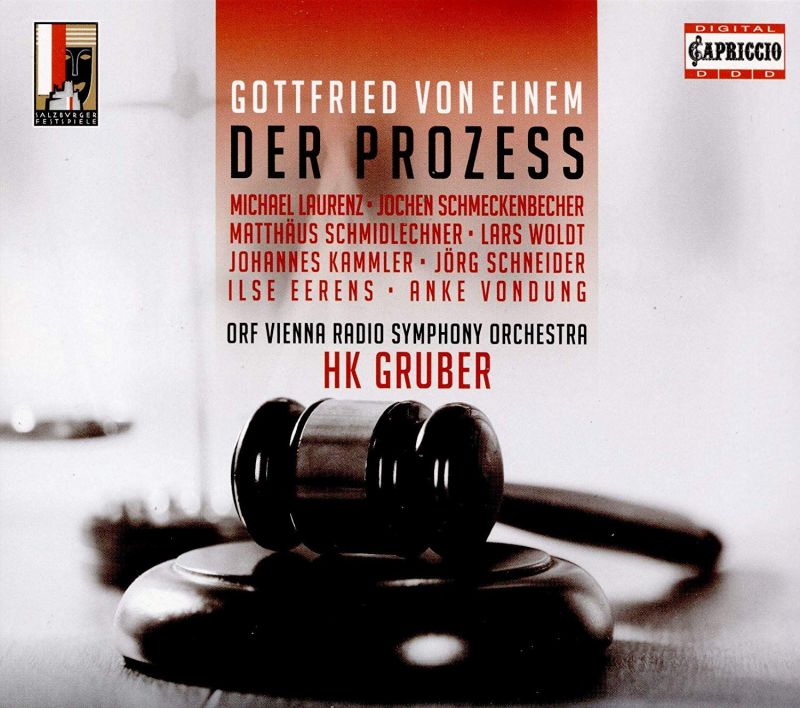EINEM Der Prozess (Gruber)
View record and artist detailsRecord and Artist Details
Composer or Director: Gottfried von Einem
Genre:
Opera
Label: Capriccio
Magazine Review Date: 07/2019
Media Format: CD or Download
Media Runtime: 104
Mastering:
DDD
Catalogue Number: C5358

Tracks:
| Composition | Artist Credit |
|---|---|
| (Der) Prozess, '(The) Trial' |
Gottfried von Einem, Composer
Alexander Hüttner, Man; Young Person, Tenor Anke Vondung, Frau Grubach, Mezzo soprano Daniel Gutmann, Man; Young Person Gottfried von Einem, Composer H K Gruber, Conductor Ilse Eerens, Leni; Court Usher's Wife; Humpbacked Girl, Soprano Jochen Schmeckenbecher, Priest; Factory Owner; Passerby, Baritone Johannes Kammler, Court Usher; Lawyer, Baritone Jörg Scneider, Titorelli, Tenor Lars Woldt, Magistrate; Flogger, Bass Martin Kiener, Man; Young Person Matthäus Schmidlechner, Student; Vice-President, Tenor Michael Laurenz, Josef K, Tenor Tilmann Ronnebeck, Chief Clerk; Uncle Albert, Bass Vienna Radio Symphony Orchestra |
Author: Mike Ashman
In Der Prozess, an early 1950s opera after Kafka’s bleak, slightly surreal novel (The Trial in English), the composer provides an object lesson in how to set a potentially intractable subject. Not only does very little ‘happen’ in the novel (until the anti hero’s literally last-minute unseen execution) but the text – although written in the third person – is a stream of consciousness and dialogue from a single central character.
Unfazed by this challenge, von Einem set to work with a whole list of unbeatable standbys of musical theatre. These put to flight the less than dramatic prospect of chains of recitative in his trademark almost neo atonal style. Tempos and orchestration were consistently varied so that a number opera emerged around the central character Josef K’s continuous encounters. The few female characters (five in a cast list of well over 20) were made the most of to contrast with an unchanging succession of male voices. And, without ever being naturalistic, music of contrasting moods and styles (even dance music) was dropped into the basically gloomy and dark setting – Prague Noir takes on overtones of New York which could approach, say, Bernstein’s almost contemporary music for West Side Story. The piece overall was very much the von Einem who sounds like a less acerbic Mahler or a more tonal Berg. All these factors helped to ease or at least obscure one remaining problem of the piece – there was a little (actually quite a lot) too much of Josef K and he had very little interesting to sing per se, even if his role was not exactly easy. But that concentration on one was the essential heart of Kafka’s novel.
The new recording comes from concert performances at last year’s Salzburg Festival celebrating the composer’s centenary. It’s led with great gusto and accuracy by one of his leading pupils. Gruber is predictably unafraid of the more modern elements and (in an accompanying note) compares his old master’s approach to that of John Adams. The singing cast is strong and accurate too.
The collector in you may be intrigued by Orfeo’s takeover of the 1953 world-premiere broadcast led by Karl Böhm, with Max Lorenz and Lisa della Casa leading the cast. It’s well rehearsed and fluent but the VPO sound just a little afraid of the noisier climaxes and syncopations. Gruber now, obviously with superior sound, provides a better document of von Einem’s score.
Discover the world's largest classical music catalogue with Presto Music.

Gramophone Digital Club
- Digital Edition
- Digital Archive
- Reviews Database
- Full website access
From £8.75 / month
Subscribe
Gramophone Full Club
- Print Edition
- Digital Edition
- Digital Archive
- Reviews Database
- Full website access
From £11.00 / month
Subscribe
If you are a library, university or other organisation that would be interested in an institutional subscription to Gramophone please click here for further information.




